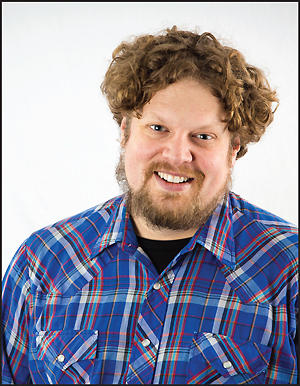The Sound of Library Science

CURRENT POSITION
User Experience Librarian for Digital Media, North Carolina State University Libraries, Raleigh
DEGREE
MIS, Indiana University, Bloomington, 2013
ON TOUR
Evans Groth has recorded his own music for two decades and toured with several indie bands. He says music brought him to librarianship
FOLLOW
@groakus (Twitter); lib.ncsu.edu/stories
Photo by Chuck Samuels/NCSU Libraries
At North Carolina State University Libraries, under the stewardship of LJ Mover & Shaker Jason Evans Groth, the belief is that harnessing the power of imagery and sound to build on research is important. “A well-organized non-written piece of communication about research in which we're invested hasn’t lost any value,” says Groth, User Experience Librarian for Digital Media. “If anything, it's more valuable — and research is just one person's daydream unless it's accessible.” If you detect a hint of the artist in Groth’s characterization about research, there’s good reason. Groth considers librarianship a second career. He says he can admit now, after all these years, that he really went to college to be in a band. “I started playing in bands in the summer of 1994, and haven't looked back,” he says. It was through music that he first fell in love with libraries. In the late ‘90s, he and his punk rock friends in Bloomington, IN, would meet at the Monroe County Public library to share tour info. “The fact that the library encouraged us to be there, helped us find and use resources, and, even more importantly, seemed interested in us, including wanting our music for their collection, blew my mind,” he says. “Then, when I went on tour with my band from 2001-2009, we would often call public libraries or stop in for ideas about where to eat, for directions to clubs, or email check-ins.” Fast forward a few years and Groth is repaying the debt, in a sense, at NCSU, working with sound artists, film students, and musicians on campus to promote new ways of learning. As a technology instructor for a project that used archival film footage and sound recordings projected onto a huge video wall at the University’s James B. Hunt Library, Groth was able to see how understanding the past through media is instrumental in understanding the present and planning for the future. “What happened as result of this project was five graduate students and a professor — instead of writing five papers that one professor would potentially only ever be the audience for — created an ambitious multimedia interactive project that was shown publicly for almost a week to over 150 viewers,” he says. The NCSU digital media department has just completed building four new recording studios at the D.H. Hill Library, which means there are now 11 reservable spaces in which students can produce audio any time the library is open. And, in the fall, Groth’s department will start promoting “sound sharing” — which they’re calling State of Sound — as part of the push to help drive students to these new recording spaces. “We've figured out how to make it easy for students to share their sounds with us and now we just need to let people know it's there, so we can build that body of work and start sharing back,” he says. “I know how much it meant to me that my library wanted my music 20 years ago. I want to offer that same opportunity for the audio producers of today.”
RELATED
ALREADY A SUBSCRIBER? LOG IN
We are currently offering this content for free. Sign up now to activate your personal profile, where you can save articles for future viewing









Add Comment :-
Comment Policy:
Comment should not be empty !!!